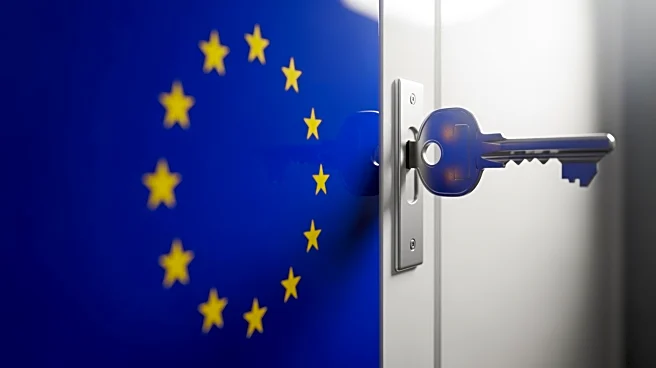What's Happening?
Moldova is making significant progress towards European Union membership, with the potential to complete the accession process by 2027. According to Gert Jan Koopman, Director-General of DG ENEST, Moldova has advanced rapidly over the past year and a half,
surpassing other EU candidate countries in its efforts. The European Commission is optimistic about Moldova's progress, emphasizing the importance of maintaining the current pace to align with EU standards. The upcoming parliamentary elections on September 28 are crucial, as a pro-EU government is essential for continuing reforms. Russia is expected to attempt to influence the elections, posing a threat to Moldova's EU accession process.
Why It's Important?
Moldova's potential EU membership is significant for both the country and the European Union. For Moldova, joining the EU would mean increased political stability, economic growth, and access to EU markets and resources. It would also strengthen Moldova's position against external threats, particularly from Russia. For the EU, Moldova's accession would expand its influence in Eastern Europe and reinforce its commitment to supporting democratic reforms in neighboring countries. The accession process also highlights the EU's strategic interest in countering Russian influence in the region.
What's Next?
The next steps in Moldova's EU accession process include finalizing technical work by September and opening negotiating clusters in 2025. The European Commission and the EEAS are preparing to counter potential Russian interference in the upcoming elections. Moldova's progress is linked to Ukraine's accession process, which could be affected by Hungary's veto power. The possibility of decoupling Moldova's accession from Ukraine's is being considered to avoid delays. The EU-Moldova Association Council meeting on June 4 will further discuss Moldova's integration into the EU.
Beyond the Headlines
Moldova's EU accession process involves complex geopolitical dynamics, including the influence of Russia and the interconnectedness with Ukraine's accession. The process also reflects broader EU strategies to promote stability and democracy in Eastern Europe. Moldova's reforms and integration efforts are crucial for its long-term development and security, as well as for strengthening EU-Moldova relations.

















